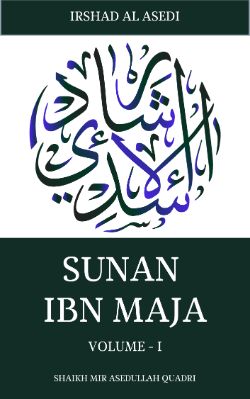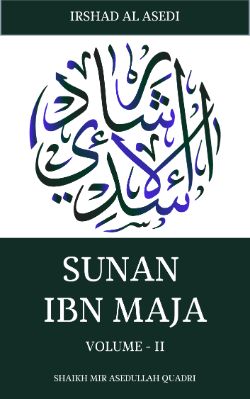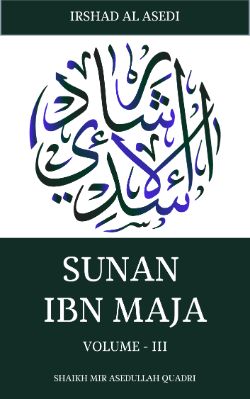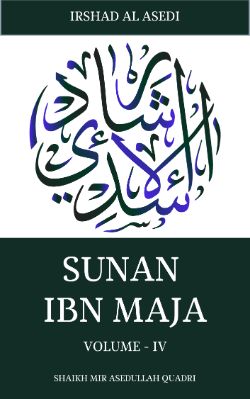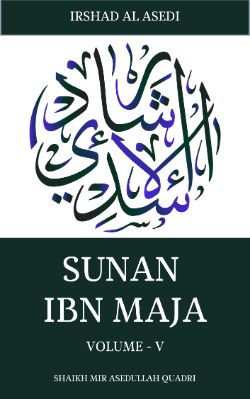
Irshad Al Asedi
SUNAN IBN MAJAH (سنن ابن ماجه)
Sunan Ibn Majah (سنن ابن ماجه) was compiled by Imam Abu Abdullah Muḥammad Ibn Yazīd Ibn Mājah ar-Rabʻī al-Qazwīnī (ابو عبد الله محمد بن يزيد بن ماجه الربعي القزويني), 824–887/209-273 AH (رضئ اللہ تعالی عنہ).
BIOGRAPHY OF IMAM IBN MAJA (رضئ اللہ تعالی عنہ)
Imam Ibn Maja (رضئ اللہ تعالی عنہ) is one the great Hadith scholars. He was a respectable critic in the field of Ḥadīth. He also wrote a comprehensive exegesis of the holy Quran. In addition, he was a great historian whose rank has been acknowledged by scholars all through the history of Islam. His Hadith book Sunan Ibn Maja is among the six major books of Ahadith in Islamic literature.
Imam Ibn Majah was born in Qazwin, Khurasan, during the reign of Caliph al-Ma'mun. His date of birth is not known. It is believed that he was born in 209 AH (829 AD). The name 'Ibn Maja' is believed to be the 'alias' (assumed name) of his father.
EDUCATION
Very little is known about the early life of the Imam, except that he was from Persian descent. Qazwin was an important place of learning during his time. Thus, the Imam had an opportunity to learn Islamic sciences. He memorized Quran early and studied religious sciences like Fiqh, Hadith, Tafsir, etc, by the time he was about 19 years old. Since he had a special attachment towards prophetic ﷺ traditions, he started attended circles of Ahadith learning in Qazwin under Hadith scholars.
In 230 AH (845 AD) when he was 21 years old, the Imam started traveling to other places of learning in the Islamic caliphate. He visited Basra, Kufa, Baghdad, Damascus, Makkah, Madinah, Egypt, Khurasan, etc. Wherever he went, he learned in the company of famous scholars living there. His teachers include, (i) Ibrahim ibn Al-Mundhir Al-Hizami, (ii) Muhammad ibn Abdullah ibn Numayr, (iii) Harmalah ibn Yahya, (iv) Al-Hafizh Al-Hilwani Al-Khallal, (v) Ismail ibn Musa Al-Fazari, (vi) Jabarah ibn Al-Mughallas, (vii) Abdullah ibn Muawiyah, (viii) Hisham ibn Ammar, (ix) Muhammad ibn Rumh, (x) Dawud ibn Rashid, (xi) Musab ibn Az-Zubairi, (xii) Abu Bakr ibn Abu Shaybah, (xiii) Abu Musab Az-Zuhri, (xiv) Hafizh Ali ibn Muhammad at-Tanafisi, (xv) Hafizh Amr ibn Rafi Al-Bajali, (xvi) Ismail ibn Tawbah, (xvii) Aḥmad bin Abi Bakr al-Awfi, (xviii) Muḥammad bin Abu Khalid al-Qazvīnī, (xix) Nasr bin Ali Nishapuri etc. He also learned under many students of Imam Malik.
After arduous journeys that took more than fifteen years, Ibn Majah returned to Qazwin and devoted his time in writing books and compilation of Ahadith. He also taught Ahadith to a large number of students who used to come from far off places to learn and narrate Ahadith from him. His students include (i) Muhammad As-Saffar, (ii) Ishaq ibn Muhammad, (iii) Sulaiman Al-Qazwini, (iv) Ibn Sibawayh, (v) Ali ibn Ibrahim Al-Qattan, (vi) Ali ibn Said Al-Ghaddani, (vii) Ibrahim ibn Dinar Al-Jarshi, (viii) Ali ibn Ibrahim ibn Salamah, (ix) Jafar ibn Idris, (x) Ali bin Abdullāh al-Falani, (xi) Abu Ya'la al-Khalīlī, (xii) Abu Amr Aḥmad bin Muḥammad bin Ḥakim al-Madanī al-Iṣfahānī, (xiii) Muhammad Ibn Isa Abhari, (xiv) Abu Tayyib al-Baghdadi, (xv) Abu Amr Ahmad Ibn Hakim (xvii) Ishaq Ibn Muhammad al-Qazwini (xviii) Suleman Ibn Yazeed Fami (xix) Ahmad Ibn Ibrahim, (xx) Ahmad Ibn Rooh al-Baghdadi, (xxi) Ali Ibn Sa'id al-Askari, etc.
WORKS
Imam Ibn Majah wrote many books, three of them are known. He wrote Tafsir of Quran in which he described Ahadith and comments of Sahabah and their successors. His book 'at-Tariq' is regarded as manifestation of his great scholarship and learning. Ibn Kathir called it a complete history while Ibn Khalkan, the famous historian, called it Tarikh Milh (very good history book). All books written by the Imam have been lost except his famous Sunan Ibn Maja.
Sunan Ibn Maja is one of 6 major books of Ahadith in Islamic literature. The sunan received praise from many scholars. It contains 37 books, 1560 chapters and 4341 Ahadith. It contains Ahadith that are not found in other 5 major books of Ahadith.
Many books have been written to explain Sunan Ibn Maja, like 'Misbaah az-Zajajah Ala Sunan Ibn Maja' by Imam Suyuti.
DEATH
Imam Ibn Maja died on Wednesday, 22nd Ramadhan, 273 AH (February 19, 887 AD) in Qazwin. His brother Abu Bakr led his funeral prayer. It is reported that brother Abu Abdullah and his son Abdullah Ibn Mohammad Ibn Yazid placed his body in the grave. He was buried in Qazwin. The famous poet of Qazwin, Muḥammad bin Aswad al-Qazvīnī eulogized saying, 'the loss of Ibn Māja weakened the column of the throne of knowledge and has shook up its pillars'.
SCHOLARS VIEWS
Many scholars have praised the services of Imam Ibn Maja, as follows.
(i) Abu Ya`la Al-Khalili said, 'Scholars are in agreement that Ibn Majah is a trustworthy scholar whose views are valid for argument. He has full awareness about Ahadith. He had expertise in other areas as well, like Tafseer al-Quran and Islamic History.
(ii) Ad-Dahabi wrote - 'Muhammad ibn Yazid is a great Hafiz of Ahadith and a great interpreter of Quran. He was an honest critic in Hadith literature and his knowledge was vast. He was a peerless scholar of Qazwin.'
(iii) Ibn Hajar said, 'Ibn Maja was one of the leading scholars, and a Hafiz of Hadith. He wrote in hadith, tafsir and history.
SUNAN IBN MAJAH (سنن ابن ماجه) contains 4341 Ahadith that include 1339 Aḥādīth, known as Zawā’id of Sunan Ibn Mājah that are not available in other major Ahadith books. The Sunan is arranged in line with fiqh issues, but also includes other topics like Aqīdah, explication of dreams, tribulations, etc. The chapters are arranged well, avoiding repetition of Ahadith. It contains about 3000 Ahadīth that are available in other 5 major books of Ahadith but are narrated by different chains of narrators. The multiplicity of the chain of narrators strengthen these Ahadīth. This distinguishing factor is unique with Sunan Ibn Māja.
Imam Ibn Maja wrote the following about his Sunan.
'After completing my Sunan I presented it to Imam Abu Zurah ar-Razi. After reviewing it he said, 'I think if this reached the hands of the people, all the books of Ahadith before and the ones of this time will be in vain.'
© 2025 Sahih Iman | Terms | Privacy Policy | About Us | Contact
